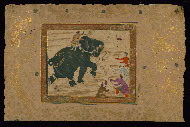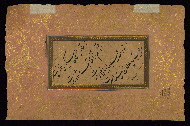Home > Digitized Walters Manuscripts
This document is a tranformation of a TEI P5 XML manuscript description incorporating images. If you have trouble reading special or non-Latin characters on this page, please make sure you have appropriate Unicode fonts installed and an up-to-date web browser.
Walters Ms. W.702, Single leaf of an elephant with mahout attacking four men
Browse images (Browse images in a new window) | TEI in XML format
W.702
Single leaf of an elephant with mahout attacking four men
This Mughal painting depicts an elephant with a mahout attacking four men. Depictions of elephants became increasingly common in the Mughal period. Stylistically this example may be attributed to sometime in the late tenth century AH / sixteenth CE, although the Persian inscription on the page states that it was completed in Bukhārā on the last day of Ṣafar 731 AH / 1330 CE. There are a few numbers inscribed on the page: 4500, 9, and 18. The work is framed by marbled paper and a border illuminated with animal and floral motifs. On the back is a sample of calligraphy in nastaʿlīq script signed by Mīrzā Muḥammad al-Kātib and dated 983 AH / 1575-6 CE.
Late 10th century AH / 16th CE
India
As-written name: Mīrzā Muḥammad al-Kātib
Leaf
Historical
The primary language in this manuscript is Persian.
Paper
Mounted on pasteboard
Foliation: Not applicable
36.0 cm wide by 23.5 cm high
- Image: 16.5 cm wide by 14.0 cm high
- Title: Elephant with mahout attacking four men
- Scribe: Mīrzā Muḥammad al-Kātib
- Hand note: Written in shikasta script (front) and nastaʿlīq script (back)
- Decoration note: Buff and salmon borders with illuminated bird, floral, and animal motifs; attributable to the late tenth century AH / sixteenth CE or eleventh century AH / seventeenth CE.
fol. W.702a:

- Title: Elephant with mahout attacking four men
- Form: Painting
- Label: This Mughal painting depicts an elephant with a mahout attacking four men. Depictions of elephants became increasingly common in the Mughal period. Stylistically this example may be attributed to sometime in the late tenth century AH / sixteenth CE, although the Persian inscription on the page states that it was completed in Bukhārā on the last day of Ṣafar 731 AH / 1330 CE. There are a few numbers inscribed on the page: 4500, 9, and 18.
fol. W.702b:
Walters Art Museum, 1931, by Henry Walters bequest
Principal cataloger: Gacek, Adam
Catalogers: Landau, Amy; Smith, Sita
Editor: Bockrath, Diane
Conservators: Jewell, Stephanie; Quandt, Abigail
Contributors: Barrera, Christina; Emery, Doug; Herbert, Lynley; Noel, William; Simpson, Shreve; Tabritha, Ariel; Toth, Michael B.; Valle, Chiara
The Walters Art Museum
Licensed for use under Creative Commons Attribution-NonCommercial-ShareAlike 3.0 Unported Access Rights, http://creativecommons.org/licenses/by-nc-sa/3.0/legalcode. It is requested that copies of any published articles based on the information in this data set be sent to the curator of manuscripts, The Walters Art Museum, 600 North Charles Street, Baltimore MD 21201.
